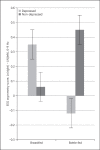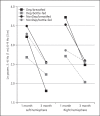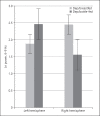Affectionate Touch in the Context of Breastfeeding and Maternal Depression Influences Infant Neurodevelopmental and Temperamental Substrates
- PMID: 33461198
- PMCID: PMC8117377
- DOI: 10.1159/000511604
Affectionate Touch in the Context of Breastfeeding and Maternal Depression Influences Infant Neurodevelopmental and Temperamental Substrates
Abstract
Background: While numerous studies have demonstrated maternal depression's influence on infant brain development, few studies have examined the changes that occur as a consequence of co-occurring experiential factors that affect quality of mother and infant affectionate touch as well as infant temperament and neurophysiological systems. The aim of the study was to examine the interactive effects of maternal depression and breastfeeding on mother and infant affectionate touch and infant temperament and cortical maturation patterns across early development.
Methods: 113 mothers and their infants participated when infants were 1 and 3 months of age. Questionnaires to assess maternal depressive symptoms, feeding, and temperament were completed. Tonic EEG patterns (asymmetry and left and right activity) were collected and the dyads were video-recorded during feeding to assess mother and infant affectionate touch patterns.
Results: Data analysis showed that EEG activity and mother-infant affectionate touch differed as a function of mood and feeding method. Notably, only infants of depressed mothers that bottle-fed showed right frontal EEG asymmetry and attenuated change in the left frontal region across 3 months. Breastfeeding positively impacted affectionate touch behaviors and was associated with increased left and decreased right frontal EEG activation even for depressed groups. Furthermore, a model incorporating physiology, maternal depression, touch, temperament, and feeding indicated significant prediction for infant affectionate touch (with breastfeeding and affectively positive temperament demonstrating the strongest prediction). Con-clusion: The findings suggest that breastfeeding and the infant's positive temperament influence mother-infant affectionate touch patterns and result in neuroprotective outcomes for infants, even those exposed to maternal depression within early development.
Keywords: Depression; Early experience; Electrophysiology; Feeding; Temperament; Touch.
© 2021 S. Karger AG, Basel.
Conflict of interest statement
The authors have no conflicts of interest to declare.
Figures



References
-
- Beebe B, Lachmann F, Jaffe J, Markese S, Buck KA, Chen H, et al. Maternal postpartum depressive symptoms and 4-month mother-infant interaction. Psychoanal Psychol. 2012;29((4)):383–407.
-
- Jones NA, McFall BA, Diego MA. Patterns of brain electrical activity in infants of depressed mothers who breastfeed and bottle feed: the mediating role of infant temperament. Biol Psychol. 2004;67((1–2)):103–24. - PubMed
-
- Jones N, Field T, Fox NA, Davalos M, Lundy B, Hart S. Newborns of mothers with depressive symptoms are physiologically less developed. Infant Behav Dev. 1998;21((3)):537–41.
-
- Jones NA, Field T, Fox NA, Lundy B, Davalos M. EEG activation in 1-month-old infants of depressed mothers. Dev Psychopathol. 1997;9((3)):491–505. - PubMed
MeSH terms
LinkOut - more resources
Full Text Sources
Other Literature Sources
Medical

